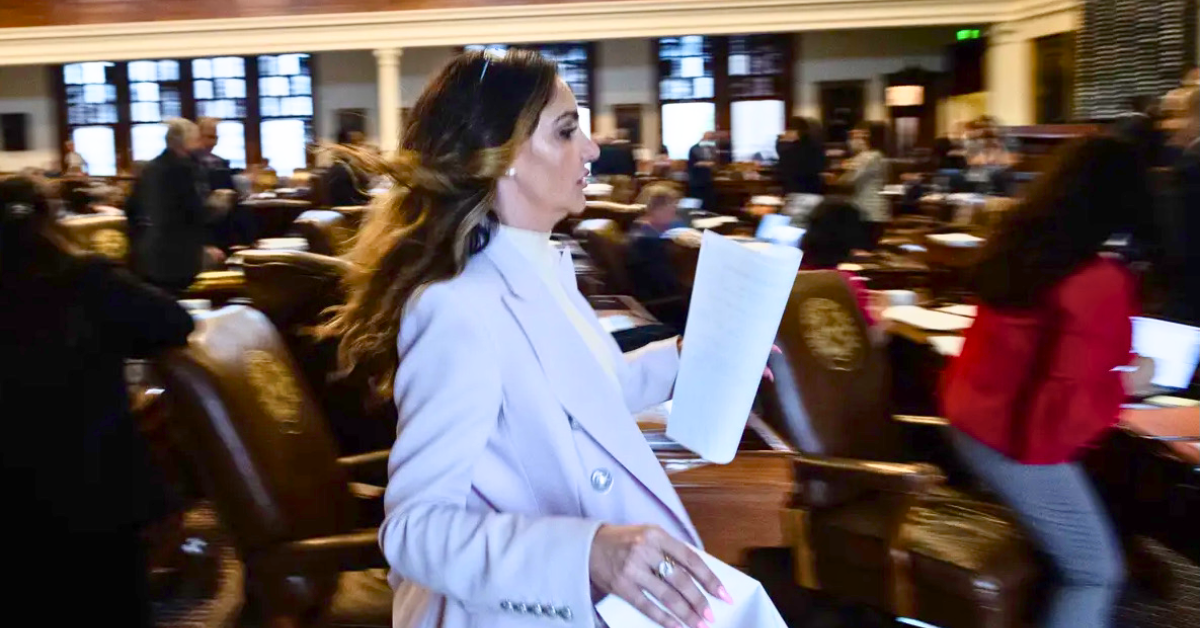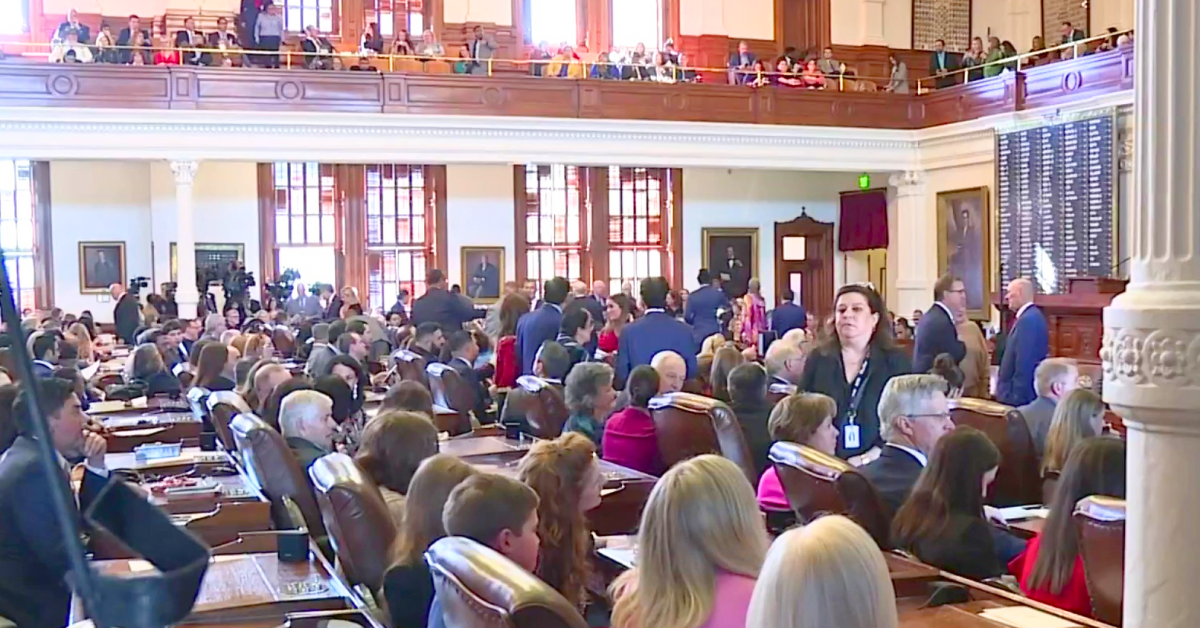On Thursday, the Texas House passed an unprecedented $302.6 billion state spending plan for the next two years, sending it to the Senate with wage hikes, tax cuts, and additional mental health care for millions of citizens.
The plan allocates $136.9 billion in general revenue to the state GOP leadership’s top two-year priorities: $17.5 billion for property tax cuts, $5 billion for schools, and $4.6 billion for border security. After record-breaking tax receipts, the budget proposal leaves tens of billions of dollars in unspent general revenue.
State Budget With Tax Cuts
A $37.2 billion surplus exceeds 24 state budgets. House Bill 1 passed 136-10 with a few Democrats and two Republicans, Reps. Tony Tinderholt of Arlington and Brian Harrison of Midlothian, voted against it.
“I am quite happy of the work that we’ve done,” House Appropriations Committee Chair Greg Bonnen said after a surprisingly brief, good-natured debate. “This package delivers unprecedented investments in property tax relief, public education, higher education, and important state infrastructure.”
Several politicians opposed the budget measure because it cut funding for public schools and teachers and banned diversity, equity, and inclusion programs. Before her 2016 election to the House, Rep. Gina Hinojosa, D-Austin, was president of the Austin ISD school board. “For parents, for women across the state who know our public schools are in critical need.”
Some Democrats supported the bill’s historic efforts and favored some of its provisions. Austin Democrat and House Appropriations Committee member Donna Howard claimed the budget package adds about $20 billion.
“I think we need to go forward with it and continue to work on it and make sure we get more that answers the needs of Texas,” Howard said.
A $14 billion emergency spending bill for the current cycle was approved by the House 147-1, including $1.6 billion for school safety, $3.5 billion for cost-of-living pension increases for retired teachers, $400 million for flood mitigation projects, and $1.5 billion for the Texas Semiconductor Innovation Fund.
Democratic proponents stated expanding Medicaid in the emergency plan would cover 1.5 million Texans, but it was defeated 83-65 on a party-line vote. The chambers will reconcile the emergency spending bill in a conference. A bipartisan coalition of House lawmakers banned public financing for private school vouchers, a major setback for Gov. Greg Abbott and Lt. Gov. Dan Patrick.
The 86-52 House vote on that amendment, just a few hours before the Senate adopted a bill that would create such a scheme, foreshadowed an uphill struggle for the initiative in the House, which has long opposed programs that employ public school dollars at private schools. Lets find out the some related news about the Texas Electric Service Providers Must Respond To Complaints Within 15 Days.
Black, brown, and white Democrats spoke out against the bill’s clause banning money from schools that implement diversity, equity, and inclusion strategies. Republicans prevented Democrats from using property tax dollars for teacher pay hikes, public school funding, or special education. A legislative commission found Texas special education underfunded by $2 billion.
Rep. Trey Martinez Fischer, the House Democratic Caucus chair, wanted to add $4 billion to the budget package to raise teacher pay from $3,800 to $10,000 over two years. The effort failed 79-66 party line. Martinez Fischer added, “Thanks for not caring about teachers,” drawing boos and catcalls from the House. Republicans frequently maintained their vote against the proposal was not against teachers during the discussion. Gary VanDeaver, R-New Boston, noted that teachers pay property taxes and are seeking assistance.
The Texas House budget debate on Thursday lasted around 10 hours, one of the shortest in recent memory. It usually begins early and lasts till midnight. In a sweeping move early in the day, members from both parties canceled hundreds of scheduled objections to parts of the 979-page budget, sparing Democrats from a partisan beatdown in the GOP-dominated House chamber. They may bypass public debate on three-quarters of the approximately 400 prefilled changes members made earlier this week. “House Bill 1 is a spending plan that every Texas House member should be proud of,” House Speaker Dade Phelan said following the vote.
A parliamentary move allowed the outnumbered Democrats to avoid defeat on several of their measures, including defunding Abbott’s border Operation Lone Star. Martinez Fischer said it also allowed Democrats to focus on their attempts to pay schools and teachers, who they say are still underpaid despite the budget bill’s rise.
“We don’t want to dilute our message. He stated public education isn’t our best. Texas Democrats stood up for education today. Many Thursday-delayed measures are still being debated in the House. We’ll eat another apple. Today we’re laser-focused.”
It helped Phelan, Bonnen, and the rest of the House avoid difficult votes on politically sensitive matters during the budget process, though many of those are sure to come up in future legislation. The budget is the only thing lawmakers must pass during the session, so budget leaders aim to keep it simple to avoid delays.
Wedge concerns persisted in the parliament. Republicans won party-line victories in campus abortion and diversity disputes, prohibiting diversity, equality, and inclusion initiatives and re-funding anti-abortion programs. Most of the failed proposals moved into an unfunded wishlist to be addressed during budget negotiations behind closed doors later in the session, including $4.2 billion in supplemental pension payments and salary rises for 123,000 retired state employees.
When North Texas state Rep. Bryan Slaton, R-Royse City, one of the chamber’s most conservative members, was missing for the day, several of his amendments were pulled or delayed. These amendments defunded the Texas Commission on the Arts and ordered Comptroller Glenn Hegar to include statements about abortion, gun rights, and genders in his tax policy e-newsletter. Slaton attempted to name border security-funded county morgues after President Joe Biden.
Amendments that passed created a kindergarten readiness grant program, trained first responders to manage fentanyl on the street, and increased control of state money spent on the failed El Paso Walmart shooter prosecution. Abbott’s administration survived both parties’ attempted raids on his special programs that support economic development, disaster relief, and Operation Lone Star, his border security mission that has cost taxpayers over $4 billion since early 2021.
House budget leaders protected border security funds, which are split across various agencies in the measure, including $1 billion for Abbott to utilize for the border. Because Texas prohibited abortion, crisis pregnancy clinics have been taking on more pregnant customers, so Congress gave them tens of millions of federal funds.
“They absolutely need this big increase in funding to keep up with demand,” said state Rep. Cody Vasut, R-Angleton, sponsor of an amendment that allocated $80 million in general revenue to the Alternatives to Abortion program. Demand exists. A need exists.”
88-59 party-line votes approved the funding. Most Democrats opposed it, saying the centers are unregulated and don’t provide health care.
“Why should this body invest additional monies in a program that has very little accountability and has not demonstrated to truly help women and families when we have good programs and solid solutions, like sponsoring our social support networks?” Driftwood Rep. Erin Zwiener.
The House also passed $402 million to fix the juvenile justice system and $343.8 million to air condition prisons. Community mental health services, new hospitals, and substance abuse treatment receive billions of dollars in the plan. Conservative state budget officials who oversaw the process defended the law against statutory and constitutional expenditure limits and refused to break them.
The Senate Finance Committee, which has been preparing its own proposal that differs from the House version, will receive the legislation after 95 hours of testimony by more than 700 witnesses and Thursday’s floor debate. The conference committee will develop a compromise bill after the Senate votes on its version later this month. Before the comptroller certifies and the governor vetoes parts of the budget, both chambers must approve it. You can click on this link to see this related news about Public Corruption Indicted Former Starr County Attorney.
House and Senate leaders disagree on how to deliver the property tax reduction promised by state Republicans. The Senate wants to increase the homestead exemption and target business tax cuts, while the House wants to limit property evaluations for families and companies. The House budget lacks $10 billion to stabilize the energy grid, which the Senate approved. The Senate’s president, Patrick, wants the House to fund the bill, which is part of an energy package.
If you like our news, then follow the Twitter handle of our site and get the latest news.




